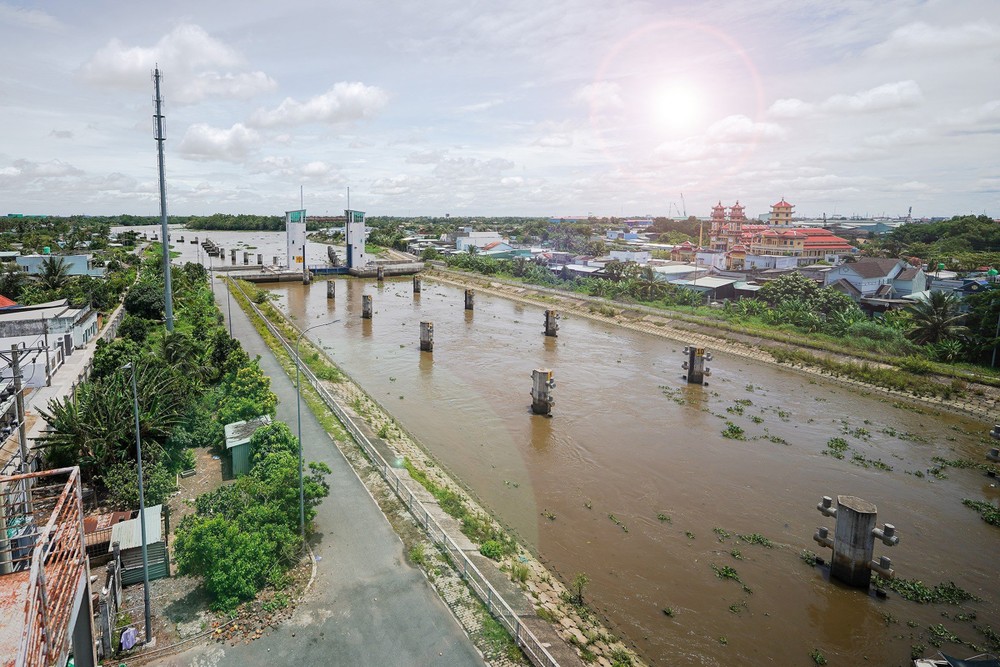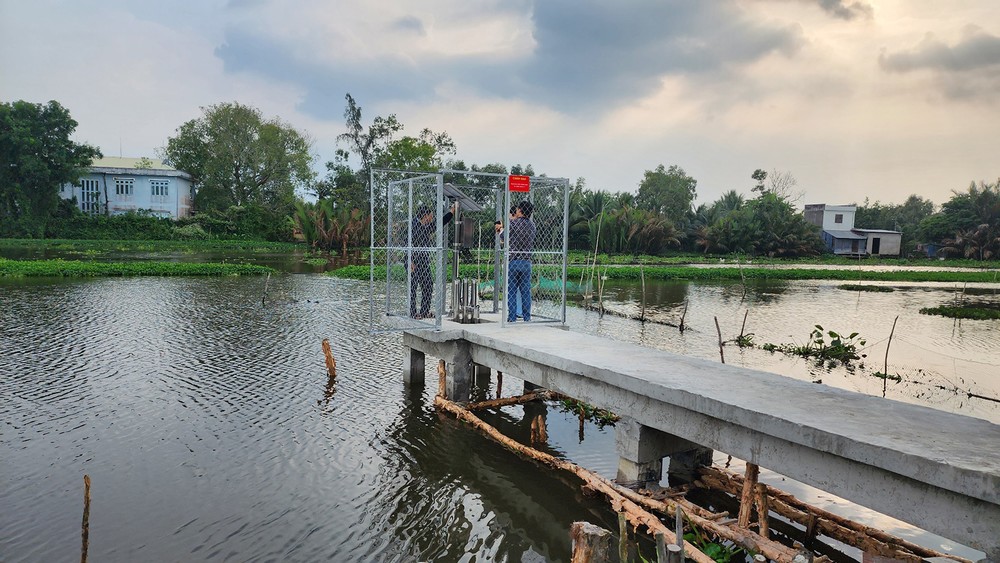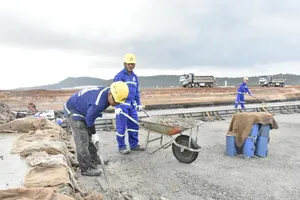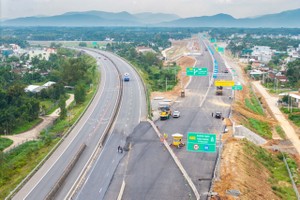
Localities in the Mekong Delta are hurrying to implement solutions for adaptation to drought and saltwater intrusion.
The drought and saltwater intrusion nearly 5 years ago caused Mr. Thai Anh Giau's 1 hectare of durians in the Mekong Delta Province of Tien Giang’s Cai Lay District to be severely depleted; worse, some trees died. Therefore, this year, Mr. Giau proactively took preventative measures. In recent days, members of his family has put all their effort into dredging all water storage ditches and digging ponds in the garden with a capacity of about 700 cubic meters to store fresh water when salt water encroaches on the garden. Mr. Giau and many farmers in the neighborhood also plan to use barges to transport fresh water to pump into reservoirs.
To prevent saltwater intrusion this year, the agricultural sector in the eastern districts of Tien Giang province recommended people adapt to the environmental changes by converting and restructuring crops and sowing the winter-spring crop earlier. In the province’s western districts, tens of thousands of hectares of fruit trees along the Tien River are easily affected by drought and salinity, so this year the authorities have completed the construction of 6 culverts on the road 864 to prevent salinity and will take fresh water from Nguyen Van Tiep canal for irrigation.
Director of the Department of Agriculture and Rural Development of Tien Giang Province Nguyen Van Man predicted that the 2023-2024 salinity and drought would be very complicated, so the sector proactively developed a response plan early. In the immediate future, the agricultural sector and localities agreed on the location of three steel dams to prevent salinity and store fresh water for durian growing areas of Cai Lay District and Cai Lay town, including Tra Tan, Ba Rai, Phu An with a total of Investment estimate of about VND34 billion (US$1.3 million). In the long term, the Department of Agriculture and Rural Development will propose to build solid steel dams such as sluices on the road 864.
Meanwhile, Vinh Long, Ben Tre, Tra Vinh, and Bac Lieu provinces in the Mekong Delta region are also applying measures to cope with saline drought. For instance, the government and local people in Phuoc Long District in Bac Lieu Province have dredged silted irrigation canals to channel water and reinforce leaking irrigation works to prevent saltwater intrusion in the past half month to protect more than 10,000 hectares of winter-spring rice. At the same time, they pumped salt water out of freshwater areas and built more than 50 temporary dams to proactively manage water resources for production.

Local Tran Thanh Nhon in Vinh Phu Dong Commune of Phuoc Long District said that this year, saltwater intrusion occurred early, while extreme weather was predicted due to El Nino phenomenon. If drought persists and salinity increases above 25‰, farmers will face difficulties in their farming. Therefore, from the end of December 2023, farmers have made a response plan. Currently, farmers keep close monitoring of the developments in saltwater intrusion while still taking care of the orchards.
Ben Tre and Ca Mau are two provinces that are most affected by saltwater intrusion in the dry season in the Mekong Delta. Currently, authorities in Ben Tre Province are implementing many proactive measures to respond to drought and saltwater intrusion in the 2024 dry season.
According to the Department of Agriculture and Rural Development of Ben Tre Province’s forecast, the worst salinity intrusion on rivers will occur in February and March 2024. Saline water with a concentration of 1‰ is likely to penetrate the entire province from January to May 2024. The Ham Luong, Cua Dai river systems, Giao Hoa - An Hoa canal into the Ba Lai River will see the salt encroachment.
Vice Chairman of Ben Tre Provincial People's Committee Nguyen Minh Canh said that the Provincial People's Committee has directed sectors and localities to drastically prepare to prevent and respond to saltwater intrusion in 2023-2024 while also taking urgent measures in response to heat, drought, and water shortage.
At the same time, the local administrations promote the storage of rainwater and fresh water. Inhabitants should make use of water storage tools in ponds, roofs, jars, tanks, and water bags; dig holes covered with tarpaulin, water reservoirs in ponds, garden ditches, and local dams in each area as well as apply other measures to ensure there is enough fresh water to serve food, daily life and production needs in case of sudden or unusual increases in saltwater intrusion.
In the Ca Mau peninsula, localities which are highly likely to be affected by saltwater intrusion from the East and West seas have prepared plans to close sluice gates to prevent saltwater intrusion. Southern Irrigation Exploitation Company said that when the salinity level at Cai Tu bridge does not exceed 1‰ (1g/liter), the Cai Lon sluice remains open freely. But if saltwater intrusion is similar to the dry season of 2015-2016 and 2019-2020, 11 gates in Cai Lon sluice will be closed. Elsewhere in Hau Giang Province, salt water has now encroached into some communes in Long My District bordering Bac Lieu, but has not yet caused damage to agricultural production.
The Mekong Delta has about 2 million hectares of land for rice and fruit trees; so the region needs fresh water for irrigation in the 2024 dry season. Of that, about 400,000-500,000 hectares are frequently affected by drought and salinity in the dry season. Currently, the Ministry of Agriculture and Rural Development is promptly adjusting the operating mechanism of irrigation works in the Mekong Delta from the prevention of salinity and storage of fresh water for rice production to the regulation of salt and fresh water balance. As freshwater resources are dwindling at an alarming rate, the agricultural sector is promoting economical irrigation programs for upland crops with the goal that the country will have 700,000-800,000 hectares irrigated economically by 2025.
























